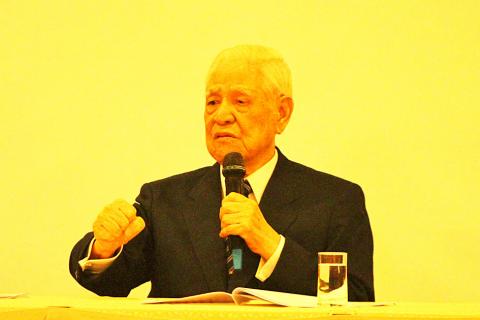To become a normal democracy, the nation has to build up its Taiwanese identity against Beijing’s threats from within and outside the nation, former president Lee Teng-hui (李登輝) said yesterday.
“The key to whether Taiwan can become a normal democracy and a leading international nation is based on whether improving the identity of ‘new Taiwanese’ succeeds,” Lee said at a convention of the Presbyterian Church in Tainan.
New Taiwanese are people who love the nation, prioritize its interests and support local democratic values, Lee said.

Photo: CNA
For the past five decades, China has been a constant threat to Taiwan, often seeking to infringe on or suppress Taiwanese sovereignty, Lee said.
Beijing is prepared to obstruct Taiwan’s democratization militarily, as it did during Lee’s term, when it launched a series of large-scale missile tests in the Taiwan Strait in the run-up to the 1996 presidential election, resulting in the Third Taiwan Strait Crisis, he said.
China has diversified its “united front” strategies by recruiting pro-unification supporters and sponsoring organized criminal activities in Taiwan to stir ethnic conflict and destabilize society, he said.
It also seeks to coerce Taiwan with economic manipulation, luring Taiwanese businesses from the nation to blunt the nation’s competitive edge, Lee said, adding that Taiwanese, while enjoying political freedom, are gradually losing economic autonomy to China.
“It is extremely irresponsible for any pro-Taiwanese leader not to take action against — or even to create — conflict between independence and unification groups,” Lee said.
“To overcome the challenge, the priority is to improve identification with Taiwan, where democracy is practiced. It is on such a basis that ethnic differences can be dissolved with democratization and anti-democracy politicians can no longer deceive the public with the fabricated ‘1992 consensus,’” he said.
The so-called “1992 consensus,” a term former Mainland Affairs Council chairman Su Chi (蘇起) in 2006 admitted making up in 2000, refers to a tacit understanding between the Chinese Nationalist Party (KMT) and the Chinese government that both sides of the Taiwan Strait acknowledge there is “one China,” with each side having its own interpretation of what “China” means.
The prosperity of a nation depends on a powerful leadership, a set of clearly defined goals and internal solidarity, Lee said.
The Democratic Progressive Party (DPP) for the first time won both the presidency and legislative majority in last year’s general elections, but its administration has been mired in growing public dissatisfaction, giving rise to the fear that a local administration might be replaced.
To prevent the “reinstatement of a Chinese administration,” such as the KMT regaining the government in 2008, the DPP government should ensure a properly functioning democracy and party system, prevent social division and proceed with reforms, Lee said.
He commended Premier William Lai (賴清德) for his insistence on Taiwanese independence, saying it is rare that a premier has the boldness to openly insist on independence.
Lai’s appointment has helped boost President Tsai Ing-wen’s (蔡英文) approval rating by 16 percentage points, and he is expected to lead economic development, Lee said.
He also called on Tsai to explain the DPP’s constitutional reform initiative to familiarize the public with the complicated issue, as DPP lawmakers have launched a proposal to amend the Constitution to pave the way for a pure presidential system.

SECURITY: As China is ‘reshaping’ Hong Kong’s population, Taiwan must raise the eligibility threshold for applications from Hong Kongers, Chiu Chui-cheng said When Hong Kong and Macau citizens apply for residency in Taiwan, it would be under a new category that includes a “national security observation period,” Mainland Affairs Council (MAC) Minister Chiu Chui-cheng (邱垂正) said yesterday. President William Lai (賴清德) on March 13 announced 17 strategies to counter China’s aggression toward Taiwan, including incorporating national security considerations into the review process for residency applications from Hong Kong and Macau citizens. The situation in Hong Kong is constantly changing, Chiu said to media yesterday on the sidelines of the Taipei Technology Run hosted by the Taipei Neihu Technology Park Development Association. With

CARROT AND STICK: While unrelenting in its military threats, China attracted nearly 40,000 Taiwanese to over 400 business events last year Nearly 40,000 Taiwanese last year joined industry events in China, such as conferences and trade fairs, supported by the Chinese government, a study showed yesterday, as Beijing ramps up a charm offensive toward Taipei alongside military pressure. China has long taken a carrot-and-stick approach to Taiwan, threatening it with the prospect of military action while reaching out to those it believes are amenable to Beijing’s point of view. Taiwanese security officials are wary of what they see as Beijing’s influence campaigns to sway public opinion after Taipei and Beijing gradually resumed travel links halted by the COVID-19 pandemic, but the scale of

A US Marine Corps regiment equipped with Naval Strike Missiles (NSM) is set to participate in the upcoming Balikatan 25 exercise in the Luzon Strait, marking the system’s first-ever deployment in the Philippines. US and Philippine officials have separately confirmed that the Navy Marine Expeditionary Ship Interdiction System (NMESIS) — the mobile launch platform for the Naval Strike Missile — would take part in the joint exercise. The missiles are being deployed to “a strategic first island chain chokepoint” in the waters between Taiwan proper and the Philippines, US-based Naval News reported. “The Luzon Strait and Bashi Channel represent a critical access

Pope Francis is be laid to rest on Saturday after lying in state for three days in St Peter’s Basilica, where the faithful are expected to flock to pay their respects to history’s first Latin American pontiff. The cardinals met yesterday in the Vatican’s synod hall to chart the next steps before a conclave begins to choose Francis’ successor, as condolences poured in from around the world. According to current norms, the conclave must begin between May 5 and 10. The cardinals set the funeral for Saturday at 10am in St Peter’s Square, to be celebrated by the dean of the College